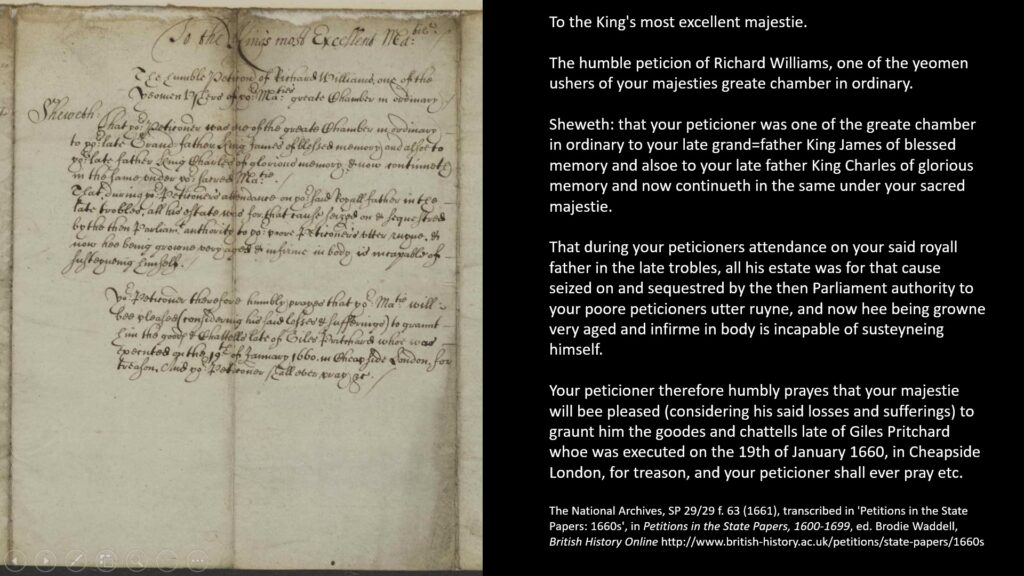When the monarchy was restored in England in 1660, the new king, Charles II, was met with a flood of petitions from suitors seeking royal favour after nearly two decades of war and disruption. These were variously addressed to the king himself, his Privy Council or various other key ministers.
As part of ‘The Power of Petitioning’ project, we have transcribed and published almost 400 of these manuscripts from across the seventeenth century on British History Online. We also completed a six-month Shared Learning Project with a large group of amateur researchers from the London Region of the University of the Third Age.
Each of these researchers wrote one or more reports about the petitioners and their requests or complaints. The introduction to this U3A project includes much more information, including important caveats about accuracy and interpretation. These 32 reports cover the period from the Restoration in 1660 to the death of Charles II in 1685.

As you will see from the list below, these include all sorts of requests from all sorts of people, from powerful aristocrats seeking favours to labouring men and women asking for assistance in times of need. Many of the petitioners directly recall the civil conflicts of the 1640s and 50s, seeking resolution or revenge for difficulties that arose for them during the Interregnum. Others concerned much more mundane matters, but they all show the importance of petitioning in the Restoration period.
The Petitions and the Reports
- 1661, Richard Williams, a royal servant, seeks to benefit from a traitor’s execution
- 1661, Walter Brydall asks Charles II to grant him a post in the Jewel House
- 1662, Ralph Ironside petitions for a vicarage and chapel in Dorset
- 1662, Reginald Forster requests permission to enclose deforested land in Southampton
- 1662, Sir Thomas Killigrew and Sir Thomas Davenant ask the king to resolve conflict between rival playhouse managers
- 1663, Charles Goring, 2nd Earl of Norwich requests financial assistance from the King
- 1663, Sir Gilbert Talbot, Master of the Jewel House, requests a pension of £500 a year or repayment of outstanding loans
- 1663, The churchwardens of the parish of St Martin in the Fields plead for £100 on behalf of the poor at Christmas
- 1663, William Christian, a gentleman, pleads for a pardon from the King for alleged treason whilst imprisoned by the Earl of Derby on the Isle of Man
- 1664, Francis Roper asks for a warrant to collect the poll tax for Cambridgeshire and Huntingdonshire
- 1664, George, Duke of Buckingham, pleads for the King to facilitate the sale of land in Essex
- 1664, William, Viscount Stafford, seeks to recover forfeited lands
- 1665, Richard Erwin requests payment of outstanding arrears from his father’s annuity
- 1667, Edward Burton petitions for a consulship at Santa Cruz, South Barbary
- 1667, John Godsuffe, a surgeon from Kinsale, petitions the Navy for his wages for treating wounded seamen
- 1668, Samuel Dunninge, John Carter, William Wright, Margaret Tyson and Susan Williams plead with the King to be transported to Virginia
- 1668, William Baber, a gunpowder maker, requests payment for providing powder for the Royalist cause
- 1670, Patrick Archer asks for help to settle a dispute over land in Ireland
- 1670, Robert Bird, who aided Charles II in his escape after the Battle of Worcester, pleads for financial help
- 1671, French citizens, Lewis Sulpice Jonquier and Martin Corbonell, plead to be tried by a jury composed equally of English and French jurors
- 1671, The distressed Widow Dergofsky pleads for financial assistance
- 1674, Sir William Boreman asks the king to convince Thomas Peirce to complete and help publish the scholarly work of his father-in-law Hugh Robinson
- 1676, Sir John Shorter and other merchants request compensation for the loss of their ships
- 1677, Francis Savage pursues a fine placed upon John Bill
- 1677, Sir John Godolphin, Vice-Admiral of North Cornwall, asks for reassurance that his costs for protecting the ship The Arms of Waterford will be met
- 1678, John Every and other grooms of the queen’s privy chamber request the same privileges and advantages afforded to the king’s grooms
- 1679, Mary Collier, a widow and daughter of Sir Thomas Lunsford, pleads for a place for her son Richard at Sutton’s Hospital
- 1680, William Challoner hopes that the Lord Mayor of London may correct his petition so that it can be presented to the king
- 1681, Alexander, Earl of Eglinton pleads for a pardon for killing a man over a game of cards
- 1683, Sir John Guillim, Guard to the King, seeks his pay arrears
- 1684, Richard, Lord Maitland, professes his loyalty to the king and hopes to be released from custody
For further petitions and reports from the rest of the seventeenth century, return to the main ‘Investigating Petitioners’ page.
